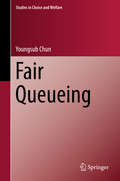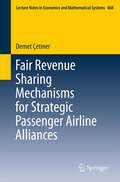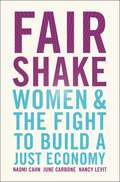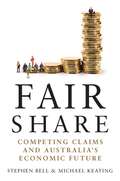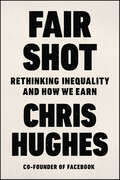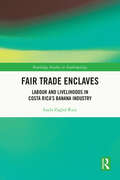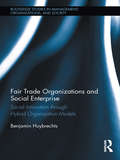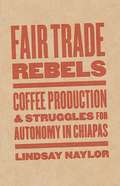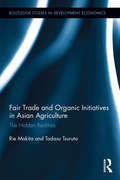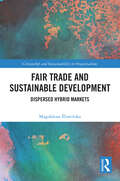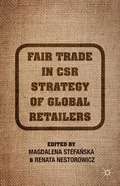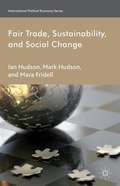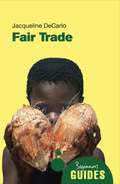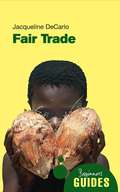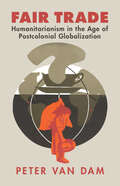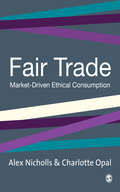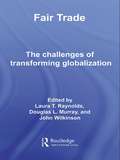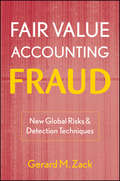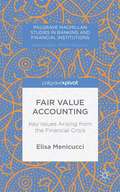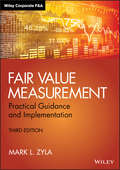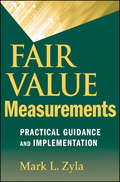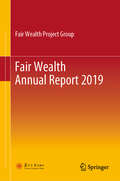- Table View
- List View
Fair Queueing
by Youngsub ChunThis monograph provides a detailed analysis on fair queueing rules from a normative, a strategic, and a non-cooperative viewpoint. The queueing problem is concerned with the following situation: There is a group of agents who must be served in a facility. The facility can handle only one agent at a time and agents incur waiting costs. The problem is to find the order in which to serve agents and monetary transfers they should receive. The queueing problem has been studied extensively in the recent literature.
Fair Revenue Sharing Mechanisms for Strategic Passenger Airline Alliances
by Demet ÇetinerA major problem arising in airline alliances is to design allocation mechanisms determining how the revenue of a product should be shared among the airlines. The nucleolus is a concept of cooperative game theory that provides solutions for allocating the cost or benefit of a cooperation. This work provides fair revenue proportions for the airline alliances based on the nucleolus, which assumes a centralized decision making system. The proposed mechanism is used as a benchmark to evaluate the fairness of the revenue sharing mechanisms, where the alliance partners behave selfishly. Additionally, a new selfish revenue allocation rule is developed that improves the performance of the existing methods.
Fair Shake: Women and the Fight to Build a Just Economy
by June Carbone Naomi Cahn Nancy LevitA stirring, comprehensive look at the state of women in the workforce—why women&’s progress has stalled, how our economy fosters unproductive competition, and how we can fix the system that holds women back.In an era of supposed great equality, women are still falling behind in the workplace. Even with more women in the workforce than in decades past, wage gaps continue to increase. It is the most educated women who have fallen the furthest behind. Blue-collar women hold the most insecure and badly paid jobs in our economy. And even as we celebrate high-profile representation—women on the board of Fortune 500 companies and our first female vice president—women have limited recourse when they experience harassment and discrimination. Fair Shake: Women and the Fight to Build a Just Economy explains that the system that governs our economy—a winner-take-all economy—is the root cause of these myriad problems. The WTA economy self-selects for aggressive, cutthroat business tactics, which creates a feedback loop that sidelines women. The authors, three legal scholars, call this feedback loop &“the triple bind&”: if women don&’t compete on the same terms as men, they lose; if women do compete on the same terms as men, they&’re punished more harshly for their sharp elbows or actual misdeeds; and when women see that they can&’t win on the same terms as men, they take themselves out of the game (if they haven&’t been pushed out already). With odds like these stacked against them, it&’s no wonder women feel like, no matter how hard they work, they can&’t get ahead. Fair Shake is not a &“fix the woman&” book; it&’s a &“fix the system&” book. It not only diagnoses the problem of what's wrong with the modern economy, but shows how, with awareness and collective action, we can build a truly just economy for all.
Fair Share: Competing Claims and Australia's Economic Future
by Stephen Bell Michael KeatingWinners and losers: it's the brutal reality in most advanced economies. Increased inequality, economic stagnation and financial instability are the consequences of technological change, globalisation and the massive increase in financial systems. Governments struggle to deal with the unrest this creates and to resolve competing claims for the spoils of growth. Australia's egalitarian traditions and past reforms have served the country well, but the risks of weakening demand, stagnating living standards and structural unemployment are growing and require urgent attention. Does Australia have the fiscal and political capacity to achieve a reform agenda? Can the Australian political system manage these vital changes? Will voters support them? Fair Share ignites the necessary debate to instigate action.
Fair Shot: Rethinking Inequality and How We Earn
by Chris Hughes"...deeply felt and cogently argued...Hughes makes a powerful case that deserves a respectful hearing." —The Financial TimesFacebook co-founder Chris Hughes argues that the best way to fight income inequality is with a radically simple idea: a guaranteed income for working people, paid for by the one percent.The first half of Chris Hughes’s life played like a movie reel right out of the “American Dream.” He grew up in a small town in North Carolina. His parents were people of modest means, but he was accepted into an elite boarding school and then Harvard, both on scholarship. There, he met Mark Zuckerberg and Dustin Moskovitz and became one of the co-founders of Facebook. In telling his story, Hughes demonstrates the powerful role fortune and luck play in today’s economy. Through the rocket ship rise of Facebook, Hughes came to understand how a select few can become ultra-wealthy nearly overnight. He believes the same forces that made Facebook possible have made it harder for everyone else in America to make ends meet. To help people who are struggling, Hughes proposes a simple, bold solution: a guaranteed income for working people, including unpaid caregivers and students, paid for by the one percent. The way Hughes sees it, a guaranteed income is the most powerful tool we have to combat poverty and stabilize America’s middle class. Money—cold hard cash with no strings attached—gives people freedom, dignity, and the ability to climb the economic ladder. A guaranteed income for working people is the big idea that's missing in the national conversation. This book, grounded in Hughes’s personal experience, will start a frank conversation about how we earn in modern America, how we can combat income inequality, and ultimately, how we can give everyone a fair shot.
Fair Trade Enclaves: Labour and Livelihoods in Costa Rica’s Banana Industry (Routledge Studies in Anthropology)
by Layla Zaglul RuizFair Trade Enclaves tells the story of exploitation and inequality in the production of Fair Trade bananas. It draws on immersive fieldwork in Costa Rica, which was the original testing ground for US-owned plantations and is today the world’s third-largest exporter of bananas. The book offers an ethnographic study of Fair Trade’s impact on the ‘Dollar’ banana system and considers how the growth in Fair Trade affects workers’ livelihoods at the source of production. It documents the labour conditions and daily struggles of Costa Rican banana workers, featuring a comparative anthropological assessment of Fair Trade and conventional farms. The chapters provide a window onto Fair Trade’s ability to effect change within one of the world’s most exploitative and enduring commodity chains, exposing how Fair Trade currently fails to challenge the structural exploitation of banana production within the dollar system. The author reveals how, in some respects, workers at the conventional farm enjoy better conditions compared with those employed on the Fair Trade farm. The book is valuable reading for scholars of Anthropology, Development, and Latin American Studies.
Fair Trade Organizations and Social Enterprise: Social Innovation through Hybrid Organization Models (Routledge Studies in Management, Organizations and Society)
by Benjamin HuybrechtsFor several decades, social enterprises have been pioneers in the conception and implementation of a pathbreaking social innovation: Fair Trade (FT). Fair Trade Social Enterprises have created a movement which has challenged mainstream trading practices and offered development opportunities for disadvantaged producer groups in the South. Starting from a niche market aimed at convinced customers, FT has expanded and entered mainstream retailing outlets, growing in visibility and market share, while simultaneously experiencing diversification of its organization models. While pioneer Fair Trade Social Enterprises in the early years were largely nonprofit organizations relying on voluntary work, they have become increasingly diversified in terms of legal forms, governance models and organizational practices. These diversified models seem to reflect the hybrid nature of FT itself, through different ways of combining a commercial activity (trading of FT products), a social mission (support to producers), and an explicit or implicit political message (often expressed through education and advocacy). Based on the study of Fair Trade Social Enterprises across Europe, this book builds a typology of organization models for FT. Author Benjamin Huybrechts further examines how the different organization models combine the economic, social, and political dimensions of FT, and how they manage the possible tensions between these dimensions. Fair Trade Organizations and Social Enterprise proposes a range of theoretical approaches to interpret the diversity of Fair Trade Social Enterprises and offers concrete avenues for managing social enterprises and hybrid organizations in general.
Fair Trade Rebels: Coffee Production and Struggles for Autonomy in Chiapas (Diverse Economies and Livable Worlds)
by Lindsay NaylorReassessing interpretations of development with a new approach to fair trade Is fair trade really fair? Who is it for, and who gets to decide? Fair Trade Rebels addresses such questions in a new way by shifting the focus from the abstract concept of fair trade—and whether it is &“working&”—to the perspectives of small farmers. It examines the everyday experiences of resistance and agricultural practice among the campesinos/as of Chiapas, Mexico, who struggle for dignified livelihoods in self-declared autonomous communities in the highlands, confronting inequalities locally in what is really a global corporate agricultural chain.Based on extensive fieldwork, Fair Trade Rebels draws on stories from Chiapas that have emerged from the farmers&’ interaction with both the fair-trade–certified marketplace and state violence. Here Lindsay Naylor discusses the racialized and historical backdrop of coffee production and rebel autonomy in the highlands, underscores the divergence of movements for fairer trade and the so-called alternative certified market, traces the network of such movements from the highlands and into the United States, and evaluates existing food sovereignty and diverse economic exchanges. Putting decolonial thinking in conversation with diverse economies theory, Fair Trade Rebels evaluates fair trade not by the measure of its success or failure but through a unique, place-based approach that expands our understanding of the relationship between fair trade, autonomy, and economic development.
Fair Trade and Organic Initiatives in Asian Agriculture: The Hidden Realities (Routledge Studies in Development Economics)
by Rie Makita Tadasu TsurutaIn addition to constituting an evolving area of inquiry within the social sciences, agricultural certification, and particularly its Fair Trade and organic components, has emerged as a significant tool for promoting rural development in the global South. This book is unique for two reasons. First, in contrast to existing studies that have tended to examine Fair Trade and organic certification as independent systems, the studies presented in this book reveal their joint application within actual production settings, demonstrating the greater complexity entailed in these double certification systems through the generation of contradictions and tensions compared with single certification systems. Second, the authors, who are both Asian, reveal the realities of applying Fair Trade and organic certification systems within Asian agriculture. In doing so, they challenge the fact that most Fair Trade studies have been undertaken by Western scholars who have tended to focus on Latin American and African producers. Drawing on a wealth of grounded case studies conducted in India, Thailand, and the Philippines, this pioneering study on double certification makes a significant contribution to studies on Fair Trade and organic agriculture beyond Asia.
Fair Trade and Sustainable Development: Dispersed Hybrid Markets (Citizenship and Sustainability in Organizations)
by Magdalena ŚliwińskaFair Trade constitutes a social-business initiative that plays a crucial role in the transition towards a "sustainable market economy", countering the major challenges of the 21st century. This research monograph reveals the mechanisms behind this process. It argues that Fair Trade constitutes a new type of market, "a Dispersed Hybrid Market (DHM)", that due to its specific features contributes to a more pro-social functioning of the entire market and taking responsibility for sustainable development by different market participants. It demonstrates, thus, what was underestimated about Fair Trade, and which is extremely important, that it can have a positive impact on the market in terms of sustainable transformation. The book is intended for researchers, lecturers, students, practitioners, and political decision-makers interested in sustainable development, Fair Trade, and transition towards sustainable markets, business, and economy. It contributes to better understanding of sustainability challenges explaining specifics of Fair Trade market, revealing paradoxes and barriers of its development and showing mechanisms of its spillover effects. It also develops arguments about the need to change the role of the state in the face of global challenges and to support such grassroots international initiatives as Fair Trade. Therefore the practical recommendations address both the desired directions of development of the self-governance of this initiative and the expected role of the state towards it, in particular possible ways to strengthen it.
Fair Trade in CSR Strategy of Global Retailers
by Magdalena Stefańska Renata NestorowiczFair Trade In CSR Strategy of Global Retailers shows how retailers can improve the success of their fair trade strategy. Using Polish market research, the authors analyze the aggressive and detrimental competition between retailers such as Ikea, and Tesco to emphasize the benefits of CSR strategy for stakeholders and society at large.
Fair Trade, Sustainability, and Social Change
by Mark Hudson Ian Hudson Mara FridellThe authors critically evaluate the fair trade movement's role in pursuing a more just and environmentally sustainable society. Using fair trade as a case study of the shift toward non-state forms of governance, they focus on its role not only as a regulatory tool, but as a catalyst for broader social and political transformation.
Fair Trade: A Beginner's Guide
by Jacqueline DecarloThis book serves in some measure to honor artisans and farmers and to advance their aspirations for lives of dignity and opportunity in partnership with conscious consumers and advocates. Fair Trade is definitely for billions of people in isolated villages and dilapidated shanty towns who haven't experienced all the benefits of globalization or "free trade." Fair Trade is for regular women and men who want to work hard, play by fair rules, and take advantage of sustainable economic opportunities, yet find few options available to them. It is particularly for under-educated women and other disadvantaged groups fighting to survive on the fringes of society in the face of discrimination or against invisibility in a world where the rich and powerful are held up as role models.
Fair Trade: A Beginner's Guide (Beginner's Guides)
by Jacqueline DecarloWhat's wrong with buying regular coffee? Does Fair Trade necessarily mean ethical trade? What impact can the average consumer have on global economics? Author and activist Jacqueline DeCarlo reveals why the movement has come to mean far more than just bananas, coffee, and chocolate. Grounded in the inspiring power of Fair Trade as a positive alternative to poverty, environmental destruction, and human exploitation, this enlightening book explains how we can make a difference. Providing an accessible explanation of the principles behind the movement and tracing its development into the powerful economic and social justice tool it is today, Fair Trade: A Beginner's Guide will rouse readers of all backgrounds to help end global injustice. Jacqueline DeCarlo is Fair Trade Program Officer of Catholic Relief Services.
Fair Trade: Humanitarianism in the Age of Postcolonial Globalization
by Peter van DamThe fair trade movement has been one of the most enduring and successful civic initiatives to come out of the 1960s. In the first transnational history of the movement, Peter van Dam charts its ascendance and highlights how activists attempted to transform the global market in the aftermath of decolonization. Through original archival research into the trade of handicrafts, sugar, paper, coffee and clothes, van Dam demonstrates how the everyday, material aspects of fair trade activism connected the international politics of decolonization with the daily realities of people across the globe. He explores the different scales at which activists operated and the instruments they employed in the pursuit of more equitable economic relations between the global South and North. Through careful analysis of a now ubiquitous global movement, van Dam provides a vital new lens through which to view the history of humanitarianism in the age of postcolonial globalization.
Fair Trade: Market-Driven Ethical Consumption
by Charlotte Opal Dr Alex Nicholls'Today, Fair Trade finds itself at a crucial point in its evolution from alternative trading mechanism to a mainstream economic model. As the only certifier in the largest Fair Trade market in the world, TransFair USA has observed the explosive growth in consumer awareness and business interest in Fair Trade certification. New research into the progress of Fair Trade to date and, crucially, its key future directions is urgently needed. Fair Trade is therefore a valuable and timely contribution.The range and depth of the book is considerable. It is international in outlook and engages with a broad spectrum of theory and thinking. Its style is approachable yet rigorous. I would strongly recommend it to industry, academics, students, policy-makers and the interested reader in general' - Paul Rice, CEO, TransFair USA 'This work - a powerful study of the maelstrom of issues and cross currents in the Fair Trade and Development movements is long overdue. Through case studies, quantative analysis and reasoned arguement, this work makes its case with cogent force' - Hamish Renton, Product Manager Food You Can Trust, Tesco 'With the fair trade sector growing rapidly, it is vital that the concept is understood properly and the future potential mapped out. Fair Trade provides a comprehensive guide to all aspects of fair trade which make it a "must read" for everyone from casual buyer right through to seasoned producer. Here's your chance to see how you can easily change the world for the better' - Mel Young, editor-in-chief, New Consumer, Britain's only fair trade magazine, www.newconsumer.org. Fair Trade is at a crucial moment in its evolution from alternative trading mechanism to mainstream economic model. This timely and thoughtful book looks at the strategic future for Fair Trade. Each chapter spearheads a key area of Fair Trade thinking and theory and the political, legal and economic context of Fair Trade is given careful scrutiny. Difficult questions are tackled such as `What is the role and value of corporate social responsibility?' and `What is the brand meaning of Fair Trade?' Throughout, readers are supported by: - Revealing case studies and useful data analysis; - Concise histories of different Fair Trade organisations; - Chapter summaries and conclusions.
Fair Trade: The Challenges of Transforming Globalization
by John Wilkinson Laura T. Raynolds Douglas L. MurrayThis book explores the challenges and potential of Fair Trade, one of the world’s most dynamic efforts to enhance global social justice and environmental sustainability through market based social change. Fair Trade links food consumers and agricultural producers across the Global North/ South divide and lies at the heart of key efforts to reshape the global economy. This book reveals the challenges the movement faces in its effort to transform globalization, emphasizing the inherent tensions in working both in, and against, the market. It explores Fair Trade’s recent rapid growth into new production regions, market arenas, and commodity areas through case studies of Europe, North America, Africa, and Latin America undertaken by prominent scholars in each region. The authors draw on, and advance, global commodity and value chain analysis, convention, and social movement approaches through these case studies and a series of synthetic analytical chapters. Pressures for more radical and more moderate approaches intertwine with the movement’s historical vision, reshaping Fair Trade’s priorities and efforts in the Global North and South. Fair Trade will be of strong interest to students and scholars of politics, globalization, sociology, geography, economics and business.
Fair Value Accounting Controversy at Noble Group
by Suraj Srinivasan Quinn Pitcher Siko SikochiNoble Group, founded in 1986, was a large commodities trader based in Hong Kong and listed on the Singapore Stock Exchange. In 2012, Noble shifted its business strategy towards an asset-light model. Under this model, Noble did not own mines or farms to produce commodities but built commodity sourcing capacity by working with and investing in producers in exchange for purchase and marketing contracts. Noble also worked with customers to secure supply contracts. Noble had a portfolio of 12,000 commodity contracts by end of 2014. The contracts were measured at fair value. Iceberg Research, an anonymous blog, released a series of reports starting in February 2015 alleging that Noble was too aggressive in its fair value accounting for contracts and investments in producers. Iceberg did not accuse Noble of fraud, but suggested that Noble's profits and balance sheet were highly inflated and Noble was headed for disaster. Noble defended its accounting policies and hired PricewaterhouseCoopers (PwC) to provide an independent review of fair value measurement. PwC released a positive review of Noble's accounting. However, questions remained whether Noble's contracts and investments were overvalued. The case explores Noble's business and investigates whether questions about its accounting practices were in the past following the attestation by PwC.
Fair Value Accounting Fraud
by Gerard M. ZackEssential guidance on the new fair value rules for accounting managers, auditors, and fraud investigatorsFair Value accounting is emerging as the next prime opportunity for financial statement fraud. Explaining the many complex applications of fair value accounting in the preparation of financial statements, Fair Value Accounting Fraud offers timely guidance on an up-and-coming issue as U.S. and international accounting rules pertaining to the use of fair value accounting continue to change.You'll find discussion ofU.S. GAAP and IFRS rules on fair value accounting issues, highlighting the areas most vulnerable to fraudExplanations of 75 categories of fair value accounting fraud schemesFraud risk checklist that you can put to immediate usePractical detection techniques useful for auditors, investigators and others who rely on financial statementsExpert advice from Gerard Zack, CFE, CPA, author of Fraud and Abuse in Nonprofit Organizations: A Guide to Prevention and DetectionComparing US accounting standards to International Financial Reporting Standards-thereby making this book useful worldwide- Fair Value Accounting Fraud helps you understand the new rules and develop new auditing and investigative techniques to enable you to detect potential fraud.
Fair Value Accounting at Berkshire Hathaway Inc.
by Christine Johnson Francois Brochet Suraj Srinivasan Jonas HeeseCase
Fair Value Accounting at Berkshire Hathaway Inc. (A)
by Christine Johnson Francois Brochet Suraj Srinivasan Jonas HeeseCase
Fair Value Accounting: Key Issues Arising from the Financial Crisis
by Elisa MenicucciThis book discusses how FVA affects financial reporting during the 2008 Financial Crisis.
Fair Value Measurement: Practical Guidance and Implementation (Wiley Corporate F&A #634)
by Mark L. ZylaGet up to date on the latest FASB, SEC, and AICPA guidelines and best practices Fair Value Measurement provides hands-on guidance and the latest best practices for measuring fair value in financial reporting. The Financial Accounting Standards Board (FASB), the U.S. Securities and Exchange Commission (SEC), and the American Institute of CPAs (AICPA) have all updated their guidelines for practitioners, and this book details the changes from a practical perspective. This new third edition includes a discussion on Private Company Council accounting alternatives for business combinations and impairment testing, with a detailed example of the Market Participant Acquisition Premium (MPAP), including European and Asian examples and expanded discussion of IFRS. Ancillary materials including end-of-chapter questions and answers, PowerPoint slides, and a test bank help you quickly grasp the concepts presented, making this book ideal for both classroom and practitioner use. Fair value measurement guidelines continue to evolve, and this comprehensive reference provides a valuable, up-to-date resource for preparers, auditors, and valuation specialists. Adopt the best practices for implementing the FASB's Topic 820 Learn the latest reporting requirements for fair value measurements Understand accounting alternatives for business combinations Examine the details of MPAP in Europe and Asia Applying fair value measurements to financial statements requires a move away from rules-based standards and toward application of professional judgment. This controversial shift has led to a reliance on valuation specialists, who face their own challenges in applying Topic 820 amidst an economic downturn and recovery, leading to an ever evolving set of best practices. Practitioners must stay up to date, and be aware of the changes as they occur. Fair Value Measurement provides the most recent information and a practical approach to this area of financial reporting.
Fair Value Measurements
by Zyla Mark L.A hands-on volume for financial executives with guidance on the fair value measurement process In today's dynamic and volatile markets, whether buying or selling, what corporate officers need to know is the worth of an asset today, a task that for many has become complex and at times confusing. Fair Value Measurements: Practical Guidance and Implementation demystifies this topic, offering you a nuts-and-bolts guide of the most recent developments in preparing financial statements using fair value measurements. This straightforward book covers the best practices on measuring fair value in a business combination and how to subsequently test the value of these assets for impairment. Filters complicated insider concepts into easy-to-understand information on the valuation specialist's function Discusses the many new FASB pronouncements involving fair value Instantly familiarizes you on the ins and outs of fair value financial disclosure Well-written, conversational in tone, and filled with valuable insights, Fair Value Measurements: Practical Guidance and Implementation lifts the veil of confusion from the substantial and growing requirements for fair value disclosures.
Fair Wealth Annual Report 2019
by Fair Wealth Project GroupThis book aims to bring the insights gained through this process to the public. It not only promotes the idea of fair wealth itself but also to gives a holistic view on how Chinese based companies are doing regarding various aspects of Fair Wealth. It also explains the theory foundation, methodology and rating system to help people better understand the evaluation system itself.
